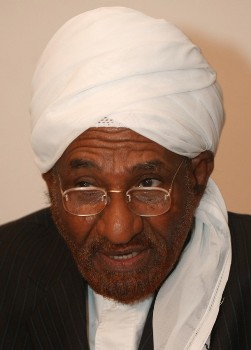Sudan opposition leader returns home amid growing dissent
June 12, 2009 (KHARTOUM) – The leader of the largest Northern opposition party in Sudan returned home after an extended stay abroad that lasted over three months.

The former prime minister has left Sudan during the last few days of the party’s convention where tensions ran high over the selection of many perceived as a pro-government Secretary General.
Al-Mahdi defended the choice of controversial Lieutenant Sideeg Ismail as Secretary General, saying that he was legitimately elected by the party members.
However, many within the party say the election mechanism was flawed.
Some observers have said that Al-Mahdi’s departure was to avoid confrontation with the dissatisfied party members over the SG choice.
Al-Mahdi has also left the country few days prior to the International Criminal Court (ICC) arrest warrant issued for Sudanese president Omer Hassan Al-Bashir raising speculations that he did not want to take sides on the issue.
The Umma party chief has generally expressed support to the ICC but opposed the warrant for Bashir saying it is “unacceptable”.
Al-Mahdi led the Friday weekly prayers telling his followers that Sudan’s problems include problems facing the North-South peace agreement, Darfur crisis, economic situation, regional tensions and ICC row.
He warned that the items he listed will lead to the “bloody” division of Sudan if no remedies are found saying that he tried his best to unite the internal front “with no success”.
He also proposed a pact with the Sudan people Liberation Movement (SPLM) calling it ‘Attractive Unity or brotherly neighborhood’ saying it lays the framework for the upcoming referendum by the South on secession in 2011.
Al-Mahdi also said he will present a new initiative on the Darfur crisis and will demand that the presidency not endorse death penalties handed down by Sudanese courts over the last few months against members of Darfur Justice and Equality Movement (JEM).
He also warned against taking the Darfur war crimes issue “lightly’ and reiterated his opposition to extraditing Bashir to The Hague.
Over a year ago the Umma party led by Sadiq al-Mahdi and the ruling National Congress Party (NCP) signed an agreement known as “National Reconciliation Agreement” which largely outlines a number of fundamental principles that both sides share the same views on.
The “National Reconciliation Agreement” has come under fire from other opposition parties who viewed it as a step towards a political alliance between the NCP and the Umma party, something which Al-Mahdi has strongly denied.
At the time Al-Mahdi blasted other opposition parties and advised them to join the agreements “before it is too late”.
However, last December the Umma Party leader acknowledged the failure of the agreement blaming “hawks inside the regime and within the opposition”.
Al-Mahdi was ousted as prime minister in a bloodless military coup in 1989 by President Omar Hassan al-Bashir and has been one of the most outspoken critics of the government ever since. However lately he has taken a more favorable position towards the government saying the latter became more accepting of other political parties.
(ST)

Majoor Atem Deng
Sudan opposition leader returns home amid growing dissent
Sadiq al Mahdi can not be trusted, the former prime minister has signed many agreements with so many different political forces including the NCP and the status of these agreements is not clear, he believes in what he calls “Inheirted National Establishments” being: Arabism, Islamism, and the economic, social, cultural privilges of the arab minority in the north that should not be compromised for any political agreement. The SPLM must be careful in dealing with Sadiq al Mahdi.